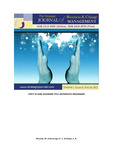Effect of Dark Leadership Style on Employee Engagement

View/
Date
2020-11-12Author
Maundu, Monah
Namusonge, G. S.
Simiyu, A. N.
Metadata
Show full item recordAbstract
This study examined the effect of dark leadership style on employee engagement in public secondary schools of Murang’a County in Kenya. A survey research design was employed. The target population was 3,860 teachers. Systematic random sampling followed by use of random numbers were applied to sample 368 respondents in 306 Public Secondary Schools. Data was analysed using descriptive statistical methods that provide measures of central tendency like the mean, standard deviation and percentages to describe the characteristics of the variables of interest in the study. The inferential statistical tools applied in this research were correlation analysis and linear regression. Statistical Package for the Social Sciences software (SPSS) version 23 was used to assist in data analysis. The results showed that dark leadership had a negative significant effect on employee engagement and its dimensions. Based on the findings of this study, it was established that applying dark leadership style on employees could reduce employee engagement. It was recommended that strategies be put in place by the Ministry of Education through the Teacher’s Service Commission (TSC) to ensure that dark leadership style is discouraged in schools. This study contributes to the existing body of knowledge in the leadership–behavioural outcomes domain that are significant to school leaders and recommends strategies that will enhance employee engagement.
URI
http://strategicjournals.com/index.php/journal/article/view/1806http://hdl.handle.net/123456789/4524
http://dx.doi.org/10.61426/sjbcm.v7i4.1806
http://dx.doi.org/10.61426/sjbcm.v7i4.1806
Collections
- Journal Articles (BE) [333]
